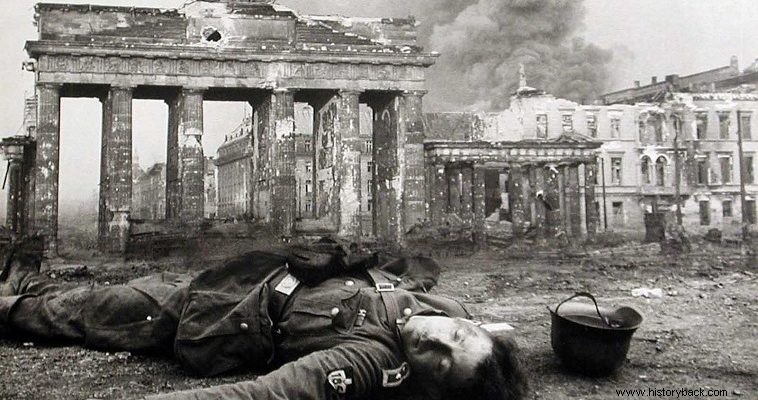
On the afternoon of April 30, 1945, the Red Army was already in the center of Berlin, very close to the chancellery. Hitler determined not to fall into the hands of the Soviets turns the revolver on him. Remaining loyalists burn the bodies of the Führer and his wife Eva Braun and bury them near the exit of the shelter.
The end of the war and the "thousand-year Reich" in Europe came on May 8, when the leadership of the Wehrmacht signed the non-capitulation of Germany. In Asia, the war continued until September 2, when Japan also capitulated after the US atomic weapons attacks on Hiroshima and Nagasaki.
It is estimated that World War II cost the lives of more than 60 million people. The material damage was enormous in all the countries through which the storm of war passed. And in Germany, which not only started the war, but also industrialized death in the concentration camps, many cities were almost completely destroyed.
Day of defeat or liberation?
But how did the Germans deal with May 8? As a day of defeat or liberation? On the online platform of the Museum of Postwar German History in Bonn, the social democratic politician Egon Barr said that:“Of course we were defeated, but what else? At the same time, it was also a day of liberation for us. But all we cared about at that moment was that we survived".
Most likely, the majority of Germans felt the same way at the end of the war. Countless survivors were traumatized. Men from fighting and an estimated 800,000 to 2 million women from rape, mostly by Soviet soldiers. Exact figures do not exist. Almost 14 million Germans were forced to leave their homelands in the former German territories of Eastern and Central Eastern Europe and had to integrate into post-war society. A defining experience, which made many Germans aware of the refugee waves in 2015.
After difficulties, both politically and socially, post-war Germany managed to emerge from the shadow of the Nazi period. Dealing with the Nazi past began in West Germany in the 1960s. For several decades after the war most Germans did not feel proud of their country. This fact began to change gradually with the Reunification in 1990 and the organization of the 2006 World Cup, when Germans began to hold, without shame, German flags.
Unfortunately, in recent years, the knowledge of the younger generations about the Second World War and the Nazi period is in decline. At the same time, the increased number of far-right attacks and actions shows that the ghosts of the past persist. Many politicians accuse the far-right Alternative for Germany party of being the moral author of the negative developments.
For its part, the AfD rejects the accusations, but at the same time it continues to cause indignation in a large part of German society with statements from its leading figures. For example:former party chairman Alexander Gauland declared in 2018 that "Hitler and the Nazis were just a blip in over 1,000 years of successful German history".
A year earlier the head of the party in Thuringia, Bjorn Hecke, had called the Memorial to the victims of the Holocaust in Berlin, near the Brandenburg Gate, a "monument of shame" while speaking of a "stupid policy of dealing with the Nazi past". However, such statements do not harm the party. For years, the AfD's ratings have been on the rise, perhaps precisely because it breaks taboos. German historian Florian Huber estimates that "we should accept the fact that the AfD today represents an important part of German society".
Chancellor Merkel took a clear position on the issue of dealing with the Nazi period on December 6, 2019. In her speech during her first visit to the Auschwitz concentration camp she emphasized that:“We are not allowed to forget the past. Nor can we stop dealing with the past, nor allow any relativization". Angela Merkel is well aware that the majority of Germans support this position. In opinion polls, the majority of citizens state that they feel they have a moral responsibility for the historical past.
SOURCE:DW
